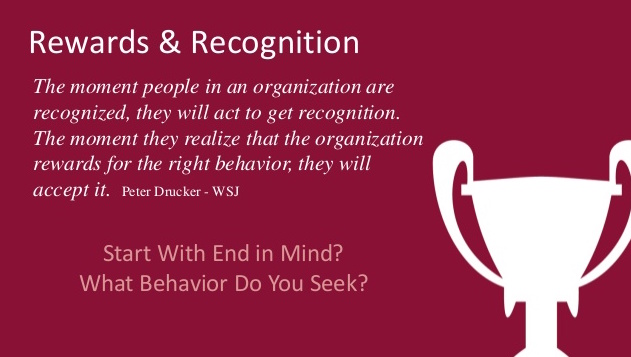by Tony Vidler ![]()
![]()
![]()

We tend to get the right behaviour when we see it and reward it repeatedly. Kindergarten teachers know it, so why don’t the leaders of professional services firms know it and use it?
Here are a couple of real examples of how this plays out:
In one instance it was watching a previously excellent professional adviser be allowed to experiment with managing others performance in an erratic fashion. In another, I watched a firm that was doing well by anyone’s standards re-shape how they should reward a fairly large crew of pretty good performers.
In the first example, the firm had created a system whereby a hard-charging and enthusiastic professional was being remunerated on a casual hourly basis for the time spent inside the business “fixing it”. Apart from losing the productive capability of a great performer this enthusiastic new leader was remunerated simply for time spent doing all of the apparent “fixing”. Predictably, more and more things needed time spent on them and more and more things suddenly needed fixing…and the hours mounted. So more money was paid over….and the cycle repeated itself ad nauseum. In just a few short months the professional believed that the more time spent worrying over everybody else’s jobs, the better the business would become. The double whammy of lost productivity or revenue together with dramatically inceasing costs were damaging to the practice.
The human toll was disasterous though. What actually happened was disenfranchised staff and colleagues throughout the business, with less focus on the individual’s real skill set and abilities which could enhance the firms prospects, and a much much higher demand for money from “the Rock Star” who “was fixing everything”, who also demanded more from the crew. It rapidly became a situation where one person saw themself as the solution to everything, and everyone else was the problem. Morale sank, people began disengaging, or leaving, placing further financial pressure on the firm which in turn required more time at a now higher price to fix everything….and you can guess how that one played out. The Rock Star became the Last Man Standing.
Lack of appropriate control mechanisms for sure, but fundamentally the wrong behaviour and focus was being rewarded.
The second example is far more uplifting, particularly given they were starting from a strong place of good performance and good morale anyway.
This well established professional services business with superb internal controls and management and with clear understanding on what every person’s primary role and value to the organisation is still wanted to make sure it was improving things for the team. It has a genuine “team” culture approach, where the attitude is the “sum of the whole is greater than the individual parts” and the owner cares about the people in the business.
While the team is (generally) performing very capably, and at higher level than most competitors, there is an inherent dissatisfaction – they believe they can, and should, do better. However there is a need to tread carefully, as the existing culture is an excellent one and the people are performing relatively well already. Management have thought very carefully about what behaviours they value, and which behaviours support their culture prior to putting together additional rewards and recognition. Most importantly perhaps, management understand that recognition itself IS a form of reward.
The end result is a reasonably simple system that focusses on 3-5 key activities that drive results for each position. A little like the old “20 points per day” process – although with a touch more sophistication to it. Complete the particular activities for your role on a daily basis and accumulate points…and everyone who hits their own benchmark number gets rewarded the same as everyone else in the organisation (no matter their job) who has hit their benchmark number too. Those who are consistently performing are recognised as leaders and role models, and given extra kudo’s as such.
There are multiple people in the organisation with similar jobs, but then there are others with very different jobs too. An excellent rewards system focuses on the actual job that each individual was brought on to do…there is no separation of those who are revenue generators, or those who are service or admin oriented. Each is part of the team for a reason and has a role to play. Each team member plays their part and is recognised and rewarded for doing so very well.
The result? a co-operative and positive culture chasing success and higher performance, but which recognises the importance of each members role within the crew regardless of the particular “status” of the role.
The lesson? Don’t underestimate the importance of which behaviours you give recognition to, and reward. Some will kill your business….some will make your business. Reward the right behaviours well.







Comments (0)